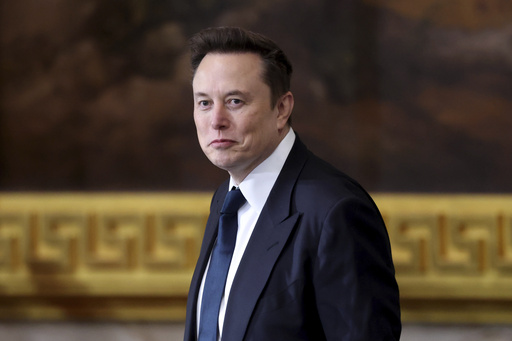OAKLAND, Calif. (AP) — Elon Musk’s lawyers faced off with OpenAI in court Tuesday as a federal judge weighed the billionaire’s request for a court order that would block the ChatGPT maker from converting itself to a for-profit company.
U.S. District Judge Yvonne Gonzalez Rogers said it was a “stretch” for Musk to claim he will be irreparably harmed if she doesn’t intervene to stop OpenAI from moving forward with its transition from a nonprofit research laboratory to a for-profit corporation.
But the judge also raised concerns about OpenAI and its relationship with business partner Microsoft and said she wouldn’t stop the case from moving to trial as soon as next year so a jury can decide.
“It is plausible that what Mr. Musk is saying is true. We’ll find out. He’ll sit on the stand,” she said.
Musk, an early OpenAI investor and board member, sued the artificial intelligence company last year, first in a California state court and later in federal court, alleging it had betrayed its founding aims as a nonprofit research lab benefiting the public good. Musk had invested about $45 million in the startup from its founding until 2018, his lawyer said Tuesday.
Musk escalated the legal dispute late last year, adding new claims and defendants and asking for a court order that would stop OpenAI’s plans to convert itself into a for-profit business more fully. Musk also added his own AI company, xAI, as a plaintiff.
Also targeted by Musk’s lawsuit is OpenAI’s close business partner Microsoft and tech entrepreneur Reid Hoffman, a former OpenAI board member who also sits on Microsoft’s board.
Gonzalez Rogers said she has a high bar for approving the kind of preliminary injunction that Musk wants but hasn’t yet ruled on the request. She did say she had “significant concerns” with two people connected to Microsoft on OpenAI’s board — Hoffman and longtime Microsoft executive Deanna Templeton, who was a “non-voting observer.”
“So you want me to believe that she was sitting there listening to all the discussions and not telling anybody? What would the point be for her to sit there and listen to everybody, if not to communicate what she was listening? There would be no point for her to be there, which is why she actually should not be there,” she said.
Hoffman, a co-founder of LinkedIn, has been on Microsoft’s board since shortly after the tech giant bought the job networking site. He stepped down from OpenAI’s board in 2023 to avoid conflicts with his AI startup, Inflection.
Templeton, who Musk also named as a defendant, was added as a non-voting member of OpenAI’s board in the aftermath of Altman’s ouster after Microsoft CEO Satya Nadella sought more stability on the board. But months later, she was dropped from the OpenAI board as U.S. antitrust enforcers were expressing concerns about such arrangements on corporate boards.
The judge has handled a number of tech industry cases including Apple’s fight with Epic Games, though she said Tuesday that Musk’s case is “nothing like” that one. That case was also the last time she granted a preliminary injunction, in 2020, eight months before the case went to trial.
Then-President Barack Obama appointed Gonzalez Rogers to the federal bench in 2011.
Tuesday’s hearing was originally set for January but was postponed after Musk’s attorney Marc Toberoff said his house was destroyed in the Pacific Palisades wildfire.
Musk, who did not attend the hearing, has alleged in the lawsuit that the companies are violating the terms of his foundational contributions to the charity. Judge Gonzalez Rogers called it a “stretch” to claim “irreparable harm” to Musk, and called the case “billionaires vs. billionaires.” She questioned why Musk invested tens of millions in OpenAI without a written contract. Toberoff said it was because the relationship between Altman and Musk at the time was “built on trust” and the two were very close.
“That is just a lot of money” to invest “on a handshake,” the judge said.
OpenAI has said Musk’s requested court order would “debilitate OpenAI’s business” and mission to the advantage of Musk and his own AI company and is based on “far-fetched” legal claims.
At the heart of the dispute is a 2017 internal power struggle at the fledgling startup that led to Altman becoming OpenAI’s CEO.
Emails disclosed by OpenAI show Musk had also sought to be CEO and grew frustrated after two other OpenAI co-founders said he would hold too much power as a major shareholder and chief executive if the startup succeeded in its goal to achieve better-than-human AI known as artificial general intelligence, or AGI. Musk has long voiced concerns about how advanced forms of AI could threaten humanity.
Altman eventually succeeded in becoming CEO and has remained so except for a period in 2023 when he was fired and then reinstated days later after the board that ousted him was replaced.
OpenAI has sought to demonstrate Musk’s early support for the idea of making OpenAI a for-profit business so it could raise money for the hardware and computer power that AI needs.
Musk is not the only one challenging OpenAI’s for-profit transition. Facebook and Instagram parent Meta Platforms has asked California’s attorney general to block it, and the office of Delaware’s attorney general has said it is reviewing the conversion.
It was not clear Tuesday when the case might go to trial. Musk’s lawyers initially said they would be ready by June after some back-and-forth with the two sides the judge indicated it probably won’t be until June 2026 at the earliest, but likely early 2027.
———————
O’Brien reported from Providence, Rhode Island.
——————-
The Associated Press and OpenAI have a licensing and technology agreement that allows OpenAI access to part of AP’s text archives.










Comments